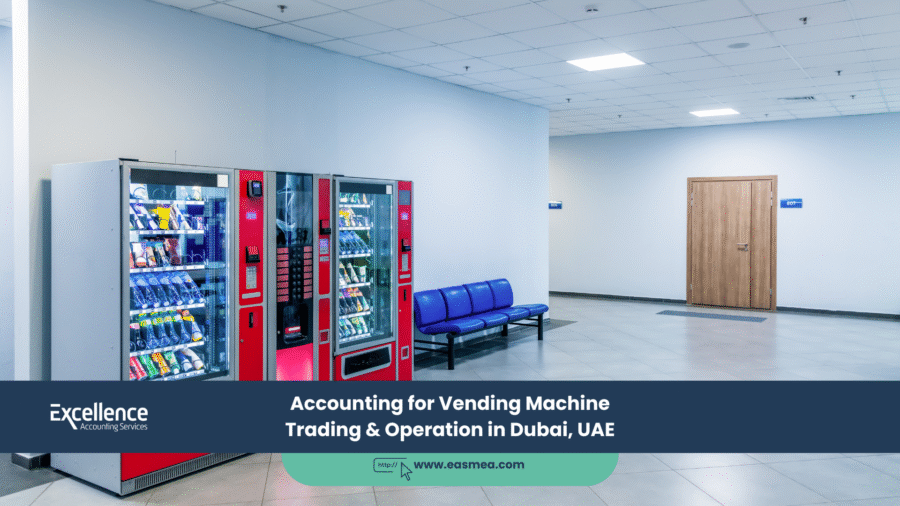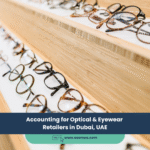Accounting for Vending Machine Trading & Operation in Dubai, UAE
The vending machine industry in Dubai is a model of modern convenience, offering automated retail solutions in high-traffic areas like malls, offices, metro stations, and residential towers. While the business concept seems simple—stock a machine and collect the cash—the underlying financial management is surprisingly complex. An operator with dozens or hundreds of machines is effectively managing a distributed network of micro-retail stores, each with its own sales, inventory, and costs.
- Accounting for Vending Machine Trading & Operation in Dubai, UAE
- The Financial Anatomy of a Vending Machine Business
- Core Accounting Principles for Vending Machine Operators
- Navigating UAE Tax and Compliance
- What Excellence Accounting Services (EAS) Can Offer
- Frequently Asked Questions (FAQs)
- Automate Your Accounting. Optimize Your Profits.
Effective accounting for a vending machine business goes far beyond counting coins. It requires robust systems to reconcile cash and cashless payments from numerous locations, sophisticated logistics for inventory management, and precise methods for calculating and paying commissions to property owners. Without a disciplined approach, vending machine operators face risks of cash leakage, inaccurate profit reporting, and non-compliance with UAE tax laws.
This guide provides a comprehensive roadmap for Accounting for Vending Machine Trading & Operation in Dubai. We will break down the essential financial controls needed to manage a distributed network of automated machines, from per-machine revenue reconciliation to the complexities of location-based commission payments and UAE tax obligations.
Key Takeaways
- Per-Machine Profitability is Crucial: You must track revenue (cash and cashless) and Cost of Goods Sold (COGS) for each individual machine to identify profitable and unprofitable locations.
- Cash Reconciliation is a High-Risk Area: Implement strict controls for cash collection, counting, and deposit to prevent shortages and theft. Reconcile physical cash with machine sales data regularly.
- Inventory is a Logistical Challenge: Your accounting system must track inventory not just in a central warehouse, but also within each machine. Account for stock movements, spoilage, and potential theft.
- Location Commissions are a Key Expense: Commissions paid to property owners are a significant operating expense. They must be calculated accurately based on sales data and recorded correctly.
- Tax Compliance is Mandatory: All products sold through vending machines are subject to 5% VAT. Your business must also comply with the 9% UAE Corporate Tax, making accurate record-keeping essential.
The Financial Anatomy of a Vending Machine Business
The vending business model involves two main activities: trading (selling the machines themselves) and operation (stocking and managing machines). This guide focuses on the operational side, which generates recurring revenue but requires constant management of cash, inventory, and location relationships.
Core Accounting Principles for Vending Machine Operators
Success in this industry depends on mastering three distinct accounting challenges: revenue reconciliation, inventory logistics, and commission management.
1. Revenue Collection and Reconciliation Per Machine
Each machine is a separate point of sale. Your primary challenge is to accurately collect and account for the revenue from every single one.
- Cash and Cashless Tracking: Modern machines accept coins, notes, credit/debit cards, and mobile payments. Your system must consolidate sales data from all these sources. Telemetry systems that provide real-time sales data are invaluable.
- Strict Cash Handling Procedures: Create a standardized process for cash collection. This should involve two-person teams (where possible), sealed collection bags, and a detailed log sheet for each machine, noting the date, time, machine ID, and amount collected.
- Reconciliation: The core of revenue accounting is reconciliation. The total sales recorded by the machine’s internal meter (or telemetry system) must be reconciled against the physical cash collected plus the total from electronic payment settlements. Any discrepancy is a “cash shortage” or “overage” that must be investigated.
In the vending business, cash is king, but data is the power behind the throne. Without reconciling sales data to physical cash for every machine, you are operating blind.
2. Inventory Stocking and Logistics
Managing inventory across a wide geographical area is a major operational and financial challenge.
- Multi-Location Inventory Tracking: Your inventory exists in two places: your central warehouse and inside the machines (which is considered “consignment” or “in-transit” stock). Your accounting system must track both.
- Restocking and COGS: When a route driver restocks a machine, you must record the movement of inventory from the warehouse to the machine. The Cost of Goods Sold (COGS) is calculated based on the items sold, derived from the machine’s sales data (Opening Stock + Restock – Closing Stock = Items Sold).
- Spoilage and Theft: Account for expired products (spoilage) and items that go missing (theft or damage). This is typically recorded as an expense or part of COGS, and tracking it helps identify problematic machines or routes.
3. Managing Location Commission Payments
The fee you pay to the owner of the property where your machine is located is a critical expense.
- Clear Commission Agreements: Have a formal contract with each location owner specifying the commission structure—typically a percentage of gross sales.
- Accurate Calculation: Commissions must be calculated based on verifiable sales data from the machine. Providing the location owner with a transparent sales report builds trust and prevents disputes.
- Correct Accounting Treatment: Location commissions are not part of COGS. They are an operating expense, often recorded as “Commissions Paid” or “Location Fees” on your income statement.
| Financial Item | Description | Accounting Treatment |
|---|---|---|
| Cash Collected from Machine #101 | Physical cash retrieved during a service visit. | Record as “Cash”. Must be reconciled against the machine’s sales report. |
| Commission to Mall Operator | 15% of monthly sales paid to the mall. | Record as an “Operating Expense” (e.g., Location Commissions). |
| Restocking a Machine | Moving snacks from the warehouse to a machine. | Transfer of inventory. Not an expense until the items are sold. COGS is recognized upon sale. |
| Credit Card Processing Fees | Fees charged by the payment gateway for cashless sales. | Record as a “Bank Charge” or “Merchant Fee,” which is an operating expense. |
Navigating UAE Tax and Compliance
The automated nature of vending does not exempt businesses from UAE tax laws. For definitive guidance, always consult the official Federal Tax Authority (FTA) website.
VAT on Vended Products
Virtually all products sold through vending machines (snacks, drinks, etc.) are subject to the standard 5% VAT rate. The price displayed on the machine should be inclusive of VAT. You are responsible for calculating the VAT component of your total sales and remitting it to the FTA. Accurate sales records are therefore essential for correct VAT filing.
UAE Corporate Tax
Your vending machine business is subject to the 9% UAE Corporate Tax on its annual taxable income over AED 375,000. Your net profit, which is the basis for this tax, is directly affected by the accuracy of your revenue reconciliation, COGS calculations, and expense tracking (like commissions and spoilage). Detailed and verifiable records are mandatory. Professional corporate tax services can ensure you meet all your obligations.
What Excellence Accounting Services (EAS) Can Offer
Managing the finances of a distributed vending network requires specialized accounting systems and controls. At Excellence Accounting Services, we provide solutions designed for the vending industry.
- Revenue Reconciliation Systems: We help you establish foolproof processes for reconciling cash and cashless sales from every machine, minimizing leakage and ensuring every dirham is accounted for.
- Inventory & COGS Management: We can implement systems to track inventory across your warehouse and entire machine network, providing accurate COGS and per-machine profitability analysis.
- Bookkeeping & Financial Reporting: Our expert accounting and bookkeeping services handle the complexities of commission payments, expense tracking, and provide clear financial statements.
- Internal Controls & Audit: Our internal audit services can review your cash handling and inventory procedures to identify weaknesses and prevent loss.
Frequently Asked Questions (FAQs)
A vending machine is a fixed asset, not an expense. You should record its full cost on your balance sheet under “Property, Plant, and Equipment (PP&E).” You will then depreciate the machine over its estimated useful life (e.g., 5-10 years), recording “Depreciation Expense” on your income statement each year.
This is a “cash shortage.” You should record the full revenue amount as per the sales meter. The AED 50 difference is recorded as an expense. The journal entry would be: Debit “Cash” for the amount collected, Debit “Cash Shortage/Overage” for AED 50, and Credit “Sales Revenue” for the total sales amount. Consistently high shortages from a specific machine warrant an investigation.
The cost of items used for testing or promotions should not be included in COGS. Instead, their cost should be moved from “Inventory” to an expense account like “Promotional Expense” or “Maintenance Expense.” This ensures your COGS only reflects items that were actually sold.
A fixed monthly rent is a straightforward operating expense. It should be recorded as “Rent Expense” on your income statement each month. This is often simpler to account for than a variable sales-based commission.
No. The costs associated with your delivery route—such as the driver’s salary, fuel, and vehicle maintenance—are considered “selling and distribution expenses,” not COGS. COGS only includes the direct cost of the products sold. Separating these costs is vital for accurate gross profit calculation.
The selling price of AED 2.50 is VAT-inclusive. To find the VAT amount, you divide the total price by 1.05 to get the pre-tax price, and the difference is the VAT. Calculation: AED 2.50 / 1.05 = AED 2.38 (base price). The VAT amount is AED 2.50 – 2.38 = AED 0.12. You owe the FTA AED 0.12 for that sale.
This is an unfortunate but necessary accounting entry. First, estimate the amount of cash stolen based on the last collection and sales data. You would record this as an “Extraordinary Loss” or “Loss due to Theft” on your income statement. The cost to repair the machine is a “Repair and Maintenance Expense.” If the machine is damaged beyond repair, you must write off its remaining book value from your fixed assets.
This is an “exchange of assets.” You need to remove the old machine from your books at its net book value (original cost minus accumulated depreciation). You then record the new machine at its fair market value. The difference, along with any cash paid, will result in a “gain or loss on disposal of assets.”
This float is not an expense. It is part of your company’s cash and should be treated as an asset. You can create a specific account called “Machine Floats” or “Petty Cash – Vending” on your balance sheet. The total of all floats across all your machines should be tracked and periodically verified.
This is a financial decision with different accounting implications. Buying (a capital expenditure) results in an asset on your balance sheet and depreciation expense. Leasing (an operating lease) results in a “Lease Rental Expense” on your income statement. Buying gives you equity but requires more upfront capital. Leasing is less capital-intensive but can be more expensive over the long term. The best choice depends on your company’s cash flow, capital access, and long-term strategy.
Conclusion: Engineering Financial Success
Operating a vending machine business in the UAE is a game of numbers, logistics, and efficiency. Success is not found in a single blockbuster sale, but in the optimized, cumulative performance of hundreds of small, daily transactions. A robust accounting framework that provides per-machine profitability data, ensures tight cash control, and manages inventory efficiently is the engine that drives growth and profitability in this automated retail landscape.
Automate Your Accounting. Optimize Your Profits.
Let Excellence Accounting Services implement the robust financial controls your vending business needs to thrive in a high-volume, cash-intensive environment.




